Kinhtedothi- Strengthening the financial health and competitiveness of state-owned enterprises in general, and of Vietnam Airlines Corporation in particular, is necessary to promote advantages, overcome limitations, and take advantage of development opportunities...
This is the general opinion of experts at the Workshop "Enhancing the role of the state economic sector in the socialist-oriented market economy in Vietnam - from the practice of Vietnam Airlines Corporation" organized by Communist Magazine, the State Capital Management Committee at Enterprises and the Central Party Committee of Enterprises on the morning of November 10.
Negative equity, accumulated loss
Associate Professor, Dr. Vu Van Phuc - Vice Chairman of the Scientific Council of the Central Party Agencies said that the Party's viewpoint on the position and role of State-owned enterprises (SOEs) is very clear, because they hold a key position, are an important material force of the State economy, are a supporting tool for the State to regulate the economy, stabilize the macro-economy, and promote economic development. SOEs play a dominant and leading role in important and essential sectors and fields of the economy, in many important infrastructure fields such as telecommunications, information technology, transportation, finance and banking...
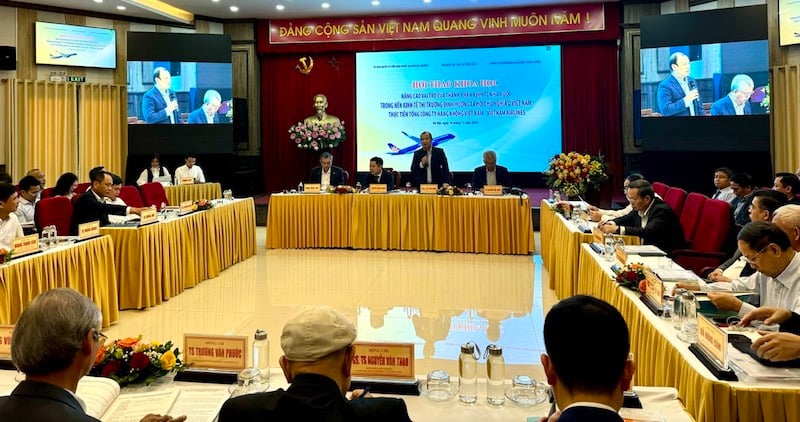
According to the Government's report to the National Assembly (2024), by the end of 2023, the country had 671 state-owned enterprises, including 06 economic groups, 53 state-owned corporations and 19 single-member limited liability companies operating under the parent-subsidiary model. Although accounting for only more than 10% in quantity, the group of groups, corporations and parent-subsidiaries plays an important economic role, holding 92% of total assets and 90% of total equity, 93% of total revenue and 85% of total state budget contributions of state-owned enterprises nationwide. Total assets and total equity of the state-owned enterprise sector reached VND 3,899,447 billion and VND 1,838,707 billion, respectively. However, with many political and social tasks to undertake, the economic efficiency of state-owned enterprises may be affected.
With Vietnam Airlines Corporation (VNA), VNA currently has a total asset size of nearly 58,000 billion VND, with a fleet of over 100 aircraft holding an important position in air transport. With over 30 years of experience in the aviation sector, VNA has many competitive and development advantages, is a 4-star national airline striving to become a leading 5-star international airline in Asia...
In the first 9 months of 2024, VNA's revenue reached VND 82,000 billion (up 17.4% over the same period). Net profit reached nearly VND 6,000 billion, a significant improvement compared to the net loss of VND 3,740 billion in the first 9 months of 2023. Gross profit margin for the first 9 months also improved significantly, reaching 11.9% compared to 6.1% in the same period last year. Despite returning to profit, VNA still incurred an accumulated loss of VND 35,225 billion, resulting in a negative equity of VND 11,086 billion.
VNA Chairman of the Board of Directors Dang Ngoc Hoa said that the severe consequences of the Covid-19 pandemic, along with the general economic difficulties, have caused VNA to face difficulties and challenges. Currently, the parent company's equity continues to be negative, accumulated losses remain high, the financial situation of the Corporation is still unbalanced, and due and overdue debts are still very large. The situation is even more difficult when geopolitical tensions arise, airlines are facing a series of disadvantages in high fuel costs, fleet upgrades, additional leasing, purchasing, aircraft maintenance, human resource shortages, exchange rate fluctuations, airport service prices, etc., so they really need the support of the State to grow in the coming time.
Institutions and cash flow, improving the efficiency of state-owned enterprises
VNA Board of Directors Chairman Dang Ngoc Hoa said that the company has built a comprehensive restructuring plan to overcome difficulties and build the future, and is requesting quick approval of the plan. The main part is to increase equity capital by 22,000 billion VND issued to existing shareholders, policies on environmental protection tax and landing costs... The proposal is to ensure infrastructure and assign VNA to participate in the Long Thanh International Airport project, and more importantly, to build aircraft maintenance and repair services...
Experts assess and calculate globally that from 2003 to 2018, if GDP increases by 1%, the aviation industry will grow by 1.28 - 2.03%. In the past 20 years, if Vietnam's GDP increases by 1%, the aviation industry will grow by about 1 - 1.5%. The importance of aviation to the economy is very large. Aviation is a particularly important industry, the lifeblood of the country. Not only in economic development, aviation also plays an important role in security, military and national sovereignty issues. Therefore, it is necessary to continue to have solutions to overcome difficulties and innovate, improve operational efficiency to overcome the crisis, recover soon and develop sustainably.
However, the restructuring process of the national airline is facing some difficulties and shortcomings due to the lack of synchronization of legal mechanisms and policies. “In the law on capital management for state-owned enterprises, the State only provides capital for the security and defense sectors. That is an institutional bottleneck. If the State provides more capital, it will be difficult. But if enterprises increase their charter capital and increase their public offerings, the Securities Law stipulates that loss-making enterprises cannot issue public offerings,” said Mr. Truong Van Phuoc, former Acting Chairman of the National Financial Supervision Committee.
Therefore, the State needs to focus on reviewing and perfecting institutions and legal regulations on aviation, tourism, legal regulations on business operations, stock market, investment, etc., especially for enterprises in which the State holds controlling shares to ensure flexibility, consistency, and suitability with reality, as a basis for handling when force majeure incidents occur.
Dr. Truong Van Phuoc proposed to immediately approve the restructuring project of VNA, and amend the securities law in the direction: "If the enterprise is losing money, but from the investor's perspective, if that enterprise has potential, investors can still buy issued shares and take responsibility for their own decisions. Capital should be concentrated through institutional mechanisms to achieve the goal of increasing capital for VNA as quickly as possible."
National Assembly Deputy Trinh Xuan An said that SOEs have three pillars: finance, human resources and science and technology (S&T). If they can be promoted, they will be effective. He proposed combining both short-term and long-term solutions... In the long term, the law amendment process should set out criteria for core SOEs and national branded enterprises to retain 100% of their profits, and pilot special mechanisms (capital, human resources, S&T). In the short term, the immediate solution is to have a fund for leading SOEs in recapitalization.
Former Vice Chairman of the National Assembly Phung Quoc Hien supports a long-term perspective. It is necessary to evaluate and review the system of relevant legal documents. From there, supplementing and editing thoroughly and promptly will create a breakthrough push to create open mechanisms and policies for SOEs in general and Vietnam Airlines in particular to develop sustainably, balancing political and economic tasks. In addition, VNA must also have its own solutions, restructure, and overcome difficulties. Have a reasonable business plan, reorganize production activities, ensure safety. Change the flight network system, change productivity... Restructure loans and debts with suppliers, apply science and technology...
Source: https://kinhtedothi.vn/phat-trien-nganh-hang-khong-trong-boi-canh-moi.html


![[Photo] General Secretary To Lam chairs the meeting of the Central Steering Committee on preventing and combating corruption, waste and negativity](https://vphoto.vietnam.vn/thumb/1200x675/vietnam/resource/IMAGE/2025/9/29/fb2a8712315d4213a16322588c57b975)
![[Photo] Many streets in Hanoi were flooded due to the effects of storm Bualoi](https://vphoto.vietnam.vn/thumb/1200x675/vietnam/resource/IMAGE/2025/9/29/18b658aa0fa2495c927ade4bbe0096df)
![[Photo] General Secretary To Lam receives US Ambassador to Vietnam Marc Knapper](https://vphoto.vietnam.vn/thumb/1200x675/vietnam/resource/IMAGE/2025/9/29/c8fd0761aa184da7814aee57d87c49b3)

![[Photo] National Assembly Chairman Tran Thanh Man chairs the 8th Conference of full-time National Assembly deputies](https://vphoto.vietnam.vn/thumb/1200x675/vietnam/resource/IMAGE/2025/9/29/2c21459bc38d44ffaacd679ab9a0477c)
![[Photo] General Secretary To Lam attends the ceremony to celebrate the 80th anniversary of the post and telecommunications sector and the 66th anniversary of the science and technology sector.](https://vphoto.vietnam.vn/thumb/1200x675/vietnam/resource/IMAGE/2025/9/29/8e86b39b8fe44121a2b14a031f4cef46)


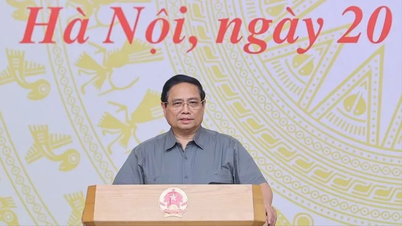





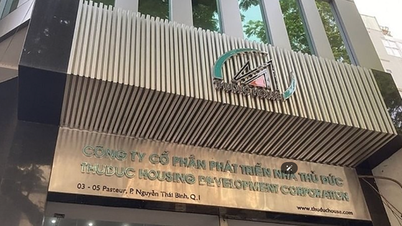




































































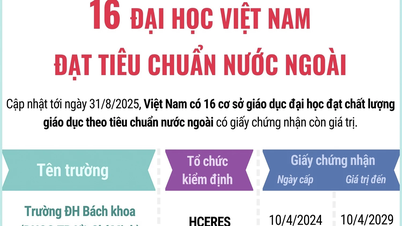



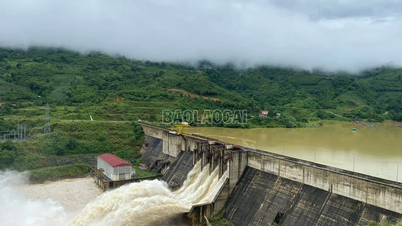


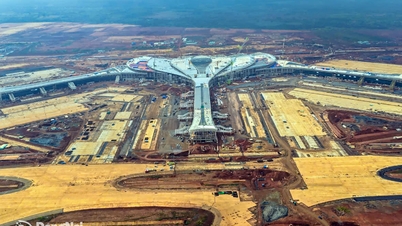














Comment (0)